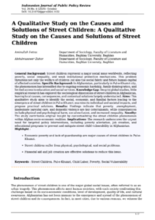Street children represent a major social issue worldwide, reflecting poverty, social inequality, and weak institutional protection mechanisms. This problem threatens not only the welfare of children but also the social fabric and future human capital of affected societies. In Afghanistan, particularly in Pul-e-Khumri city, the phenomenon has intensified due to ongoing economic hardship, family disintegration, and limited access to education and social services. Despite global studies, little empirical research has explored the sociological dimensions of street children in Afghanistan, leaving local causes, consequences, and contextual solutions largely understudied. This qualitative study aims to identify the social, economic, and familial factors leading to the emergence of street children in Pul-e-Khumri, examine its individual and societal impacts, and propose practical solutions. Findings indicate that poverty, unemployment, inadequate parental care, and domestic violence are key determinants, while consequences include physical and psychological harm, social exclusion, and increased inequality. The study contributes original insight by contextualizing the street children phenomenon within Afghan socio-economic realities. The research underscores the urgent need for targeted policy interventions, including poverty alleviation, job creation, and educational programs to prevent and mitigate street child vulnerability in Afghanistan.

